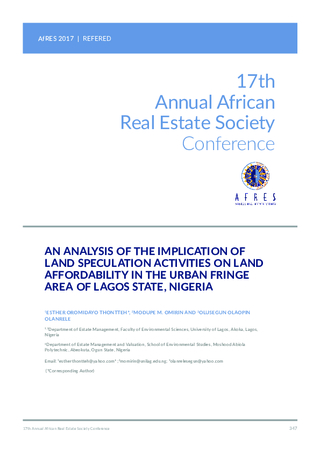PURPOSE: While affordability studies has centres on house possession through either mortgage repayment or household ability to pay rent in the developed countries, land affordability has remain a topical issue in the third world countries and emerging economy with consequential effect on the
economic growth. The purpose of this paper is to examine the activities of the real estate developers as touching the capability and ability of the first time buyers to pay for a plot of land towards actualising their home ownership dream.
DESIGN/METHODOLOGY: The study adopted a mixed method research approach where both quantitative and qualitative data are collected. A questionnaire survey was carried out with members of the
Real Estate Developers Association of Nigeria (REDAN) and household heads in Lagos urban fringe. The Income structure of the federal public service was also collected. The study developed a land affordability index relative to Affordable limit. A correlation analysis was performed to establish a relationship between developers’ activity and household affordability.
FINDINGS: The study finds a speculative motive in the activities of developers rather than solving housing supply problem resulting in non-affordability of land to the end user or first home dreamers. 77.8% of the developers’ affirmed they subdivide within two years of land purchase.
PRACTICAL IMPLICATIONS: The study revealed that the solution to the lingering housing problem in Nigeria with over 16 million unit deficit, will not come from private developers if the activities of the developers continues unabated.
ORIGINALITY/VALUE OF WORK: The paper in addition to its contribution to literature, is the first to study land affordability in developing/third world context especially where there is inefficient mortgage system for home ownership, making individuals to acquire land and build their houses.
